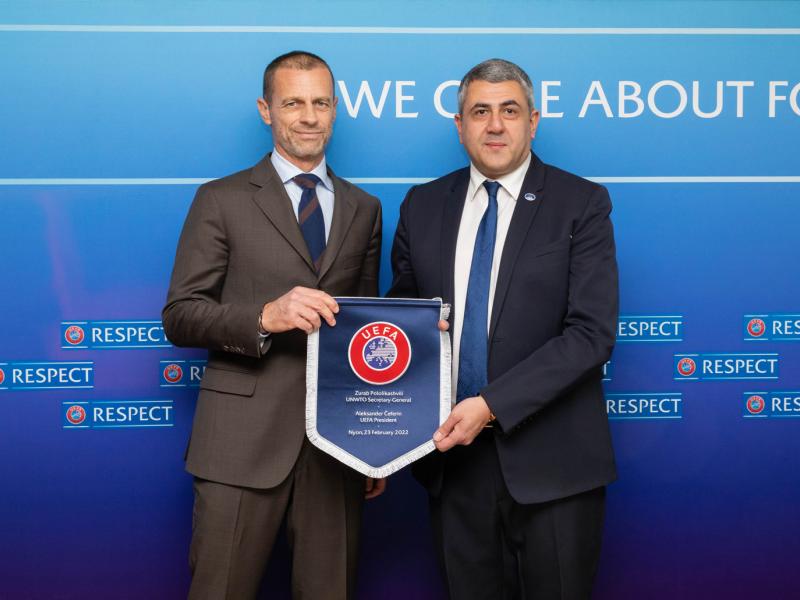The United Nations World Tourism Organization (UNWTO) and the European Committee of the Regions (CoR) have joined forces to illuminate the transformative potential of rural tourism. Through a collaborative study, they shed light on the significant impact tourism can have on fostering socio-economic development in rural areas across Europe.
This timely initiative underscores the critical role of collaboration in bridging local and global efforts toward shared goals. By harnessing the power of rural tourism, communities can build resilience, address pressing challenges, and empower themselves on the path towards sustainable development.

A Unifying Force: Collaboration for Shared Objectives
Zurab Pololikashvili, Secretary-General of UNWTO, emphasizes the far-reaching potential of tourism: “Tourism has the potential to transform societies, stimulate local economic development, and empower local communities.” He further highlights the significance of the collaboration with the CoR, stating, “This joint study… underscores the importance of rural tourism in contributing to sustainable development in Europe.”
Alves Vasco Cordeiro, President of the CoR, echoes this sentiment, emphasizing the historical role of mobility in shaping European identity: “Free movement has always been at the heart of the European project. Tourism, as part of this mobility, has helped shape our European identity and is a powerful driver for growth and jobs, breathing new life into communities across Europe.”
This joint effort highlights the importance of fostering partnerships between international organizations and regional entities to create a unified approach to rural tourism development.
Beyond Recovery: The Resilience of Rural Tourism
The report delves into the key findings of the study, offering valuable insights into the current state and prospects of rural tourism in Europe.
One of the most compelling findings is the remarkable resilience displayed by rural tourism in the wake of the COVID-19 pandemic. Despite global challenges, rural destinations witnessed a surge in popularity, particularly among domestic travelers. This resilience highlights the inherent strength of rural tourism and its adaptability to changing circumstances, showcasing its potential as a robust driver for economic recovery and growth.
Multifaceted Benefits: Economic Diversification and Cultural Preservation
The study goes beyond economic considerations, acknowledging the multifaceted benefits of rural tourism. It underscores the role of tourism in promoting economic diversification and creating job opportunities in rural areas. This diversification can help lessen dependence on traditional industries and create a more vibrant and sustainable local economy.
Furthermore, the report emphasizes the vital contribution of rural tourism to cultural preservation. It highlights tourism’s role as a bridge between tradition and modernity. By attracting visitors and fostering community participation, rural tourism can help sustain local services and preserve the unique character of rural regions.
However, the report also acknowledges the challenges faced by rural areas, such as limited infrastructure, scarcity of financial resources, and population decline. These challenges pose significant obstacles to rural tourism development.
Towards Sustainable Development: Embracing Opportunities and Addressing Challenges
The report doesn’t shy away from acknowledging the challenges faced by rural communities but instead presents them as opportunities for growth. By providing a nuanced understanding of the complexities involved, the report sets the stage for the development of sustainable rural tourism practices. It urges stakeholders to navigate these challenges thoughtfully, with a focus on long-term sustainability.
A Roadmap for the Future: Recommendations for Sustainable Rural Tourism Development
Recognizing the need for a comprehensive approach, the report offers a roadmap for policymakers, local governments, and stakeholders to harness the power of rural tourism while addressing its challenges.
Enhancing Collaboration and Building Integrated Value Chains:
A key recommendation is the integration of rural value chains within the tourism sector. The report emphasizes the need for collaboration between businesses and stakeholders, such as farmers, artisans, and accommodation providers. By working together, they can create synergies within the local economy, maximizing economic benefits for the entire community. This collaborative approach ensures a holistic and sustainable development trajectory for rural tourism.
Bridging the Digital Divide: Investing in Connectivity and Skills
The report acknowledges the digital divide that often hinders rural development. It recommends a focused effort on improving digital connectivity in rural areas. This includes infrastructure development to ensure reliable internet access. Additionally, the report emphasizes the importance of digital skills development. By empowering rural communities with the skills to leverage technology effectively, they can improve their online presence, attract more visitors, and participate more fully in the digital tourism landscape.
Aligning with Consumer Trends and Prioritizing Sustainability:
The report acknowledges the increasing focus on sustainable travel practices among tourists. It encourages the development of responsible travel initiatives that cater to evolving consumer expectations. This includes promoting eco-friendly practices, protecting natural resources, and supporting local communities. By prioritizing sustainability, rural tourism can not only meet the changing demands of travelers but also contribute to broader environmental and social goals.




